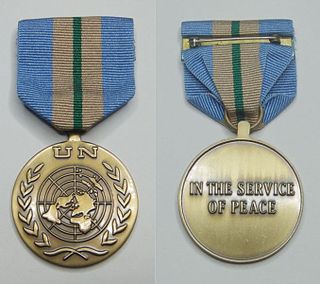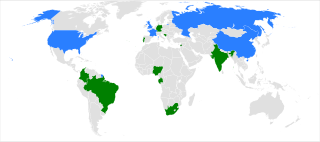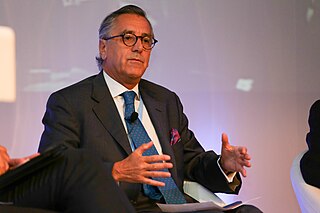Related Research Articles

The United Nations Security Council (UNSC) is one of the six principal organs of the United Nations (UN) and is charged with ensuring international peace and security, recommending the admission of new UN members to the General Assembly, and approving any changes to the UN Charter. Its powers include establishing peacekeeping operations, enacting international sanctions, and authorizing military action. The UNSC is the only UN body with the authority to issue binding resolutions on member states.

The United Nations Mission for the Referendum in Western Sahara is the United Nations peacekeeping mission in Western Sahara, established in 1991 under United Nations Security Council Resolution 690 as part of the Settlement Plan, which had paved way for a cease-fire in the conflict between Morocco and the Polisario Front over the contested territory of Western Sahara.

The United Nations Observer Mission in Georgia (UNOMIG) was established by United Nations Security Council Resolution 858 in August 1993 to verify compliance with a 27 July 1993 ceasefire agreement between the Republic of Georgia and forces in Abkhazia with special attention given to the situation in the city of Sukhumi, Georgia. It was also to investigate reports of ceasefire violations, attempt to resolve such incidents with the parties involved, and to report to the Secretary-General of the United Nations on the implementation of its mandate. 88 military advisors were authorized to be deployed to the region. It ended on 15 June 2009, when Russia vetoed an extension of the mission. The last observers left the region on 15 July 2009.

The United Nations Operations in Mozambique was a UN peace mission to Mozambique established in December 1992 under Security Council Resolution 797 with the assignment to monitor the implementation of the Rome General Peace Accords agreed upon by the Mozambican president Joaquim Chissano (FRELIMO) and Afonso Dhlakama of RENAMO. Its mandate ended in December 1994.

A United Nations Medal is an international decoration awarded by the United Nations (UN) to the various world countries members for participation in joint international military and police operations such as peacekeeping, humanitarian efforts, and disaster relief. The medal is ranked in militaries and police forces as a service medal. The United Nations awarded its first medal during the Korean War (1950–1953). Since 1955, many additional United Nations medals have been created and awarded for participation in various United Nations missions and actions around the world.
Chapter VII of the United Nations Charter sets out the UN Security Council's powers to maintain peace. It allows the Council to "determine the existence of any threat to the peace, breach of the peace, or act of aggression" and to take military and nonmilitary action to "restore international peace and security".

The United Nations Angola Verification Mission II, established May 1991 and lasting until February 1995, was the second United Nations peacekeeping mission, of a total of four, deployed to Angola during the course of the Angolan Civil War, the longest war in modern African history. Specifically, the mission was established to oversee and maintain the multilateral ceasefire of 1990 and the subsequent Bicesse Accords in 1991, which instituted an electoral process for the first time including the two rival factions of the civil war, the People's Movement for the Liberation of Angola (MPLA), the de facto government of Angola, with control of Luanda and most of the country since independence in 1975, and the National Union for the Total Independence of Angola (UNITA).

France has been a member of the United Nations (UN) since its foundation in 1945 and is one of the five countries, alongside China, Russia, the United Kingdom, and the United States, that holds a permanent seat on the United Nations Security Council (UNSC), which is responsible for maintaining international peace and security.

ONUCA and ONUSAL were two United Nations peacekeeping missions deployed in Central America during the late 1980s and early 1990s.

The United Nations Mission in Nepal or UNMIN was a special political mission in Nepal, established by the UN Security Council in January 2007 through resolution 174040 (2007) to assist in implementing key aspects of the Comprehensive Peace Agreement that ended the internal armed conflict in the South Asian country. The mandate was subsequently extended in resolutions 1796 (2008), 1825 (2008), 1864 (2009), 1879 (2009) and 1909 (2010). UNMIN ceased its operations on January 15, 2011.

The United Nations Assistance Mission for Iraq (UNAMI) was formed on 14 August 2003 by United Nations Security Council (UNSC) Resolution 1500 at the request of the Iraqi government to support national development efforts.
The United Nations Angola Verification Mission I was a peacekeeping mission that existed from January 1989 to June 1991 in Angola during the civil war. It was established by United Nations Security Council Resolution 626 on December 20, 1988.
Jean Arnault is a French diplomat who currently serves as United Nations Secretary-General António Guterres' Personal Envoy on Afghanistan and Regional Issues.

The 2010 United Nations Security Council election was held on 12 October 2010 during the 65th session of the United Nations General Assembly, held at United Nations Headquarters in New York City. The elections were for five non-permanent seats on the UN Security Council for two-year mandates commencing on 1 January 2011. The General Assembly elected Colombia, Germany, India, Portugal, and South Africa.

María Emma Mejía Vélez is a Colombian politician, diplomat, and journalist. She was the Permanent Representative of Colombia to the United Nations in New York. She served as Secretary General of the Union of South American Nations, Minister of Foreign Affairs, Minister of Education, Ambassador of Colombia to Spain, and member of the Foreign Affairs Advisory Commission of Colombia. Mejía Vélez was also a peace negotiator with FARC and ELN armed groups. For over a decade, she held the post of Executive Director to the Barefoot Foundation, a non-profit founded by Colombian singer-songwriter Shakira. Mejía Vélez also ran for vice-president and for mayor of Bogotá.

United Nations Security Council resolution 1195, adopted unanimously on 15 September 1998, after reaffirming Resolution 696 (1991) and all subsequent resolutions on Angola, the Council extended the mandate of the United Nations Observer Mission in Angola (MONUA) for a month until 15 October 1998.

Néstor Osorio Londoño is a Colombian diplomat. Former Ambassador to the United Kingdom of Great Britain and Northern Ireland and former Permanent Representative to the United Nations. He has been President of both the United Nations Security Council and the United Nations Economic and Social Council.
Lieutenant General Tadesse Werede Tesfay is Commander-in Chief of the Tigray Defense Forces. He was born in Mekelle, a city in Enderta woreda of the Tigray Region.
United Nations Security Council Resolution 2673 was passed by a unanimous vote on 11 January 2023, which extended the United Nations Verification Mission in Colombia and reaffirmed commitment to the Colombian peace process.
References
- ↑ "UN Verification Mission in Colombia | Department of Political and Peacebuilding Affairs". dppa.un.org. Retrieved 2023-02-12.
- ↑ "United Nations Security Council Press Statement on Colombia". Ghana Permanent Mission to the United Nations. 2023-01-13. Retrieved 2023-02-12.